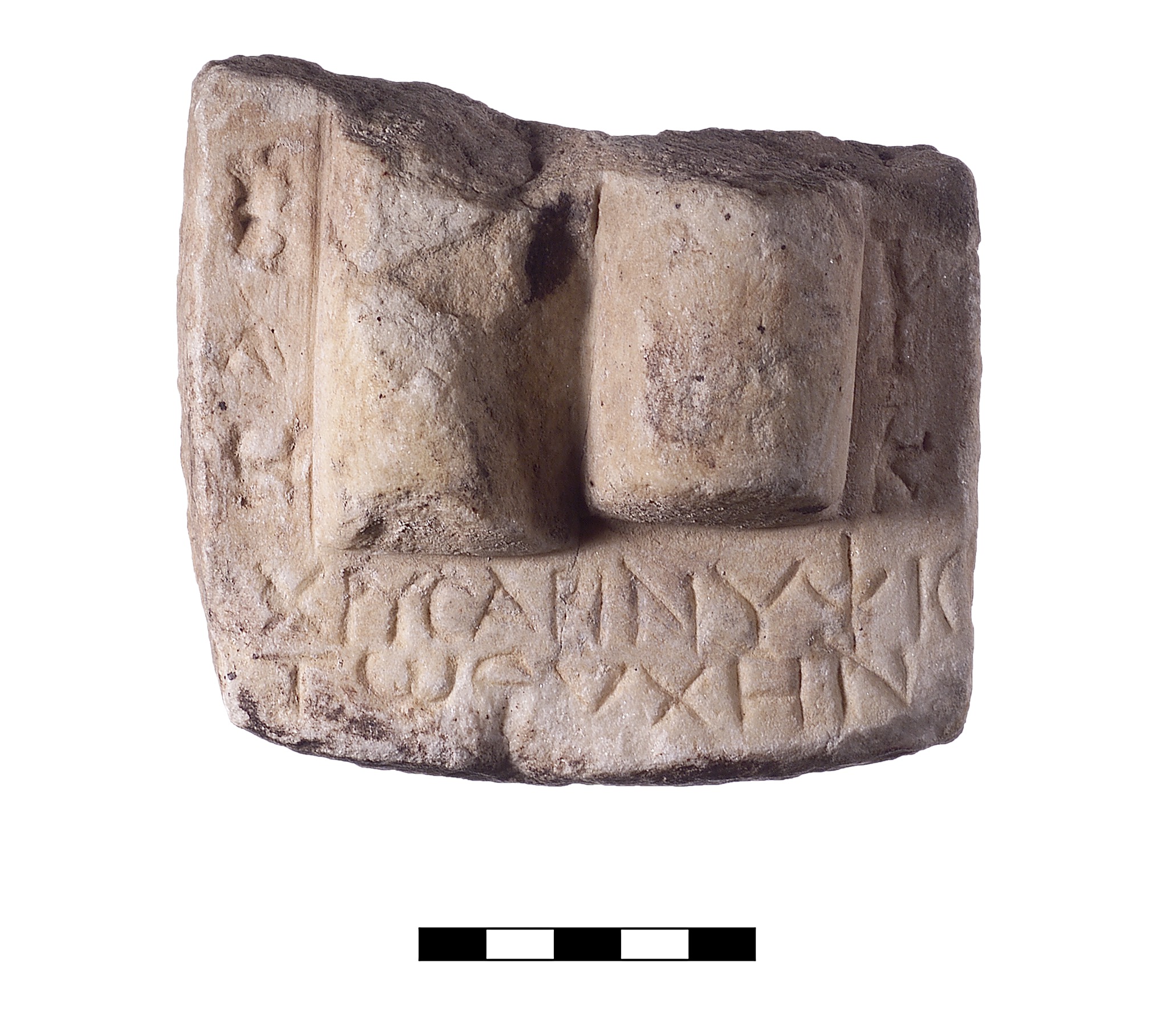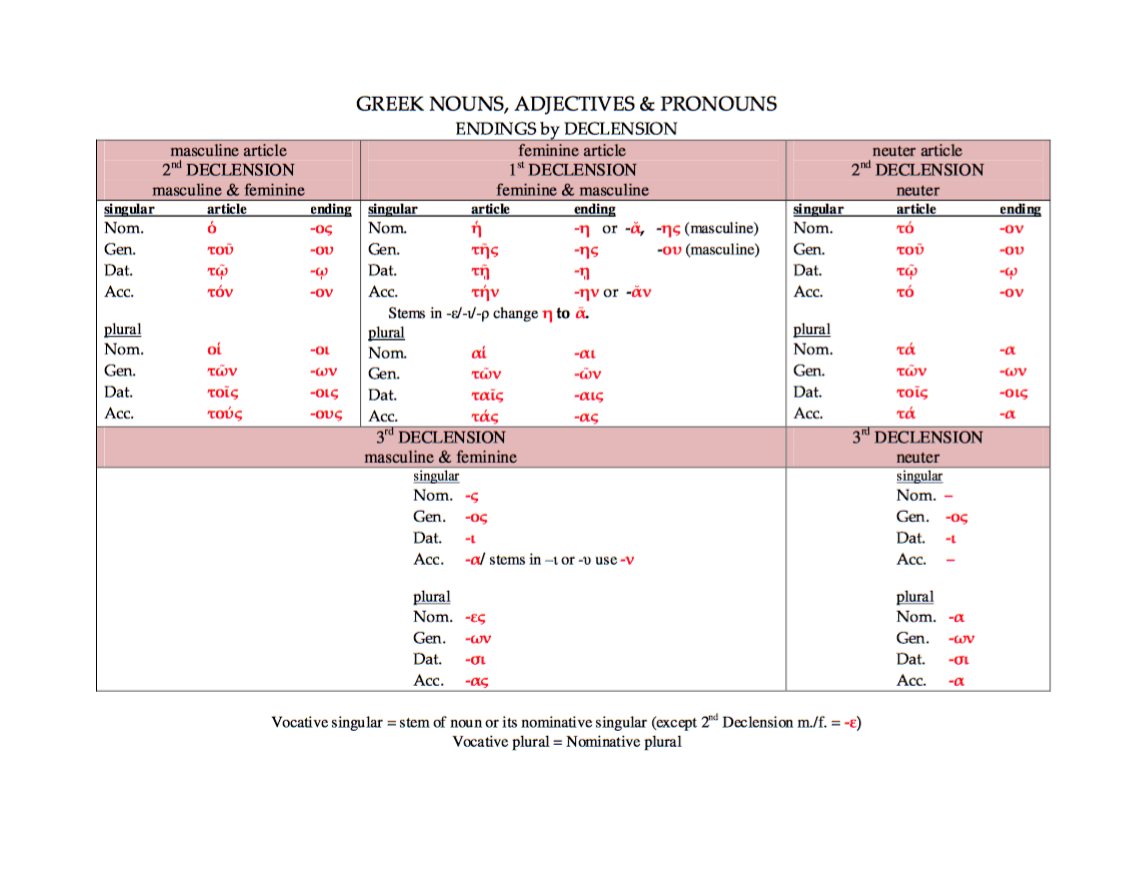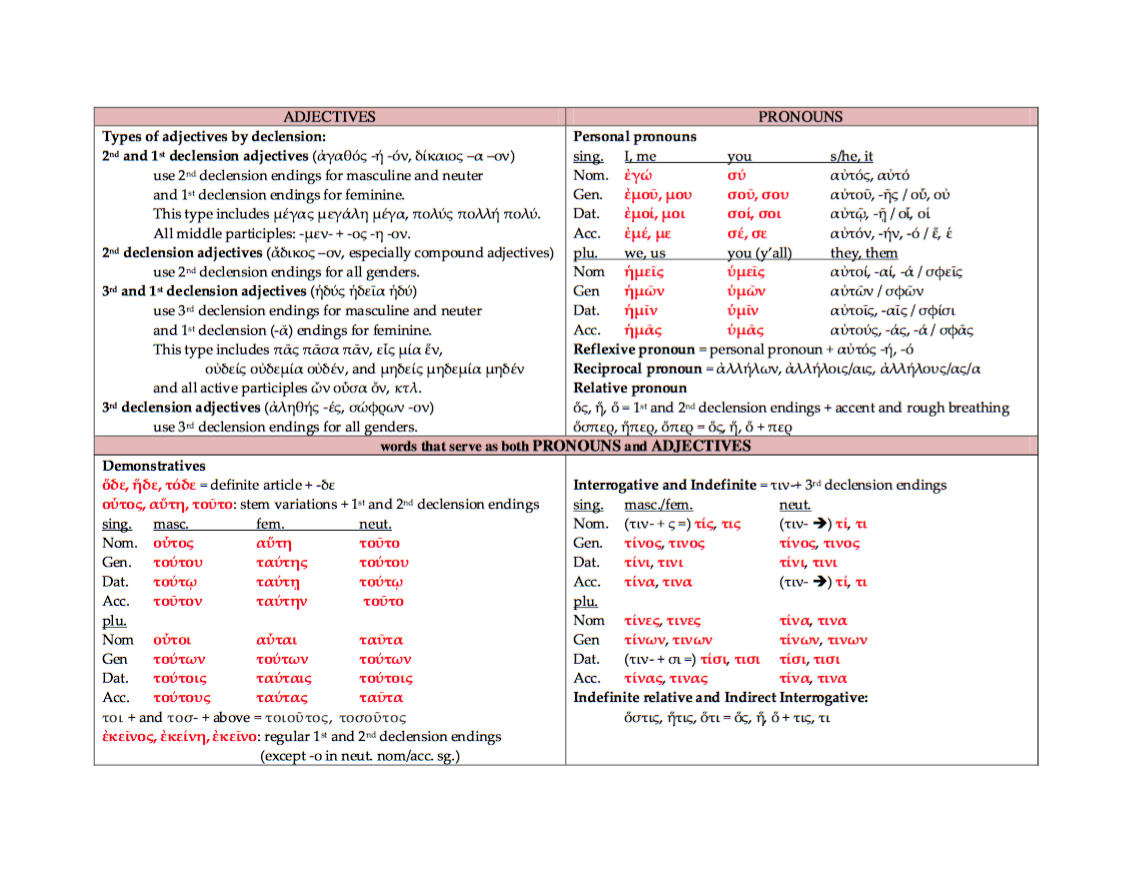30

Adjectives: Other Declension Families
We have already discussed the most common declension grouping for adjectives: Three-Ending 1st and 2nd Declension Adjectives (2-1-2). In this chapter, we cover the three other declension families:
- Two-Ending 2nd Declension Adjectives (2-2)
- Two-Ending 3rd Declension Adjectives (3-3)
- Three-Ending 1st and 3rd Declension Adjectives (3-1-3)
Two-Ending Adjectives: 2nd Declension (2-2)
A handful of adjectives, usually compounds, use 2nd DECLENSION endings for ALL GENDERS. For these adjectives:
- Both the MASCULINE and FEMININE forms share the SAME ENDINGS as 2nd DECLENSION MASCULINE nouns.
- The NEUTER form shares the same endings as 2nd DECLENSION NEUTER nouns.
ἄδικος -ον unjust (S 289; GPH p. 24)
Singular
| M/F | N | |
| Nominative | ἄδικος | ἄδικον |
| Genitive | ἀδίκου | ἀδίκου |
| Dative | ἀδίκῳ | ἀδίκῳ |
| Accusative | ἄδικον | ἄδικον |
Plural
| M/F | N | |
| Nominative | ἄδικοι | ἄδικα |
| Genitive | ἀδίκων | ἀδίκων |
| Dative | ἀδίκοις | ἀδίκοις |
| Accusative | ἀδίκους | ἄδικα |
Two-Ending Adjectives: 3rd Declension (3-3)
Another small group of adjectives uses 3rd DECLENSION endings for ALL GENDERS. For these adjectives:
- Both the MASCULINE and FEMININE forms share the SAME ENDINGS as 3rd DECLENSION MASCULINE/FEMININE nouns.
- The NEUTER form uses the same endings as 3rd DECLENSION NEUTER nouns.
These adjectives tend to fall into one of two groups:
- Adjectives ending in –ης –ες.
- These adjectives have a stem ending in –εσ.
- Adjectives ending in –(ί)ων –(ι)ον.
- These adjectives have a stem ending in –(ι)ον.
1. Adjectives in –ης –ες.
ἀληθής -ές (stem: ἀληθέσ-) true (S 292; GPH p. 26)
Singular
| M/F | N | |
| Nominative | ἀληθής | ἀληθές |
| Genitive | ἀληθοῦς | ἀληθοῦς |
| Dative | ἀληθεῖ | ἀληθεῖ |
| Accusative | ἀληθῆ | ἀληθές |
Plural
| M/F | N | |
| Nominative | ἀληθεῖς | ἀληθῆ |
| Genitive | ἀληθῶν | ἀληθῶν |
| Dative | ἀληθέσι | ἀληθέσι |
| Accusative | ἀληθεῖς | ἀληθῆ |
The contractions that produce the inflection of –ης –ες adjectives are similar to nouns in –εσ that we have already studied, e.g. Σωκράτης, -ους (stem: Σωκράτεσ-) and ἔτος -ους (stem: ἔτεσ-). The main differences are:
- For the NEUTER of 3-3 adjectives, –ες does not become –ος in the nominative and accusative singular.
- The MASCULINE/FEMININE accusative plural is identical to the nominative plural: –έσες → –εῖς.
That said, adjectives of this type are fairly rare. The only other common adjective inflected like ἀληθής -ές is σαφής -ές clear.
2. Adjectives ending in –(ί)ων –(ι)ον.
βελτίων -ον (stem: βέλτιον-) better (S 293; GPH p. 11)
Singular
| M/F | N | |
| Nominative | βελτίων | βέλτιον |
| Genitive | βελτίονος | βελτίονος |
| Dative | βελτίονι | βελτίονι |
| Accusative | βελτίονα | βέλτιον |
Plural
| M/F | N | |
| Nominative | βελτίονες | βελτίονα |
| Genitive | βελτιόνων | βελτιόνων |
| Dative | βελτίοσι | βελτίοσι |
| Accusative | βελτίονας | βελτίονα |
Notice that the inflection of –(ί)ων –(ι)ον. adjectives is similar to nouns ending in –(ι)ον. that we have already studied, e.g. δαίμων -ονος. Note that:
- In the MASCULINE/FEMININE nominative singular, –(ι)ονς becomes –(ί)ων. due to the loss of the sigma, and subsequent compensatory lengthening.
- In the dative plural of all genders, the –ν of –ονσι has dropped out, leaving only –οσι.
Three-Ending Adjectives: 1st and 3rd Declension (3-1-3)
The final group of adjectives uses 3rd DECLENSION endings for MASCULINE and NEUTER, but 1st DECLENSION endings for FEMININE.
Note, however, that when modifying a FEMININE noun, these adjectives use SHORT –ᾰ– in the NOMINATIVE and ACCUSATIVE SINGULAR. This change must be remembered, since it affects the ACCENT of these adjectives. These adjectives tend to fall into one of two groups:
- Adjectives ending in –ς –σα –ν.
- These adjectives have a stem ending in –ντ.
- Adjectives ending in –ύς –εῖα –ύ.
- These adjectives have a stem ending in –ε.
1. Adjectives in –ς –σα –ν.
While a handful of adjectives have their stems ending in –ντ, we have already encountered the most common one: πᾶς πᾶσα πᾶν all, every, whole (S 299; GPH p. 30). No others appear in our vocabulary lists.
Singular:
| M | F | N | |
| Nominative | πᾶς | πᾶσα | πᾶν |
| Genitive | παντός | πάσης | παντός |
| Dative | παντί | πάσῃ | παντί |
| Accusative | πάντα | πᾶσαν | πᾶν |
Plural:
| M | F | N | |
| Nominative | πάντες | πᾶσαι | πάντα |
| Genitive | πάντων | πασῶν | πάντων |
| Dative | πᾶσι | πάσαις | πᾶσι |
| Accusative | πάντας | πάσας | πάντα |
2. Adjectives in –ύς –εῖα –ύ.
As you study this inflection pattern, note the following:
- Remember that if the stem of the adjective ends in –ε, –ι or –ρ, ᾱ appears instead of η in feminine singular forms. The use of –ᾱ– affects only the GENITIVE and DATIVE SINGULAR for these adjectives, however. The nominative and accusative singular already have short –ᾰ-.
- In the nominative and accusative singular of the masculine and neuter, the stem ends in –υ.
- The masculine accusative singular ending is –ν.
- The masculine nominative and accusative plural are identical: see, e.g., ἡδεῖς.
- Not all of the expected contractions occur: see, e.g., ἡδέος, ἡδέων, and ἡδέα.
- All adjectives of this declension family share the same persistent accent.
ἡδύς -εῖα -ύ (stem: ἡδέ-) sweet (S 297; GPH p. 32)
Singular:
| M | F | N | |
| Nominative | ἡδύς | ἡδεῖα | ἡδύ |
| Genitive | ἡδέος | ἡδείας | ἡδέος |
| Dative | ἡδεῖ | ἡδείᾳ | ἡδεῖ |
| Accusative | ἡδύν | ἡδεῖαν | ἡδύ |
Plural:
| M | F | N | |
| Nominative | ἡδεῖς | ἡδεῖαι | ἡδέα |
| Genitive | ἡδέων | ἡδειῶν | ἡδέων |
| Dative | ἡδέσι | ἡδείαις | ἡδέσι |
| Accusative | ἡδεῖς | ἡδείας | ἡδέα |
Bringing It All Together
In the following charts you can see that you have now learned the endings of most nouns, adjectives, and pronouns that you will encounter in Greek. (To download this chart, click here: Greek Nouns Adj Pronouns Master List.)
– τὸ τέλος –
Paradigms, Key Terms and Concepts
- Chapter Paradigms
- 2ND DECLENSION TWO-ENDING ADJECTIVES (2-2)
- THE TWO STEM ENDINGS FOR 3RD DECLENSION TWO-ENDING ADJECTIVES (3-3)
- THE TWO STEM ENDINGS FOR THREE-ENDING ADJECTIVES (3-1-3)
Vocabulary
2nd Declension (2-2)
- ἄδικος -ον unjust
- ἀδύνατος -ον impossible
- βάρβαρος -ον barbaric, not Greek, foreign
- σύμμαχος -ον allied
3rd Declension (3-3)
- ἀληθής -ές true
- ἀμείνων -ον better, stronger, braver
- βελτίων -ον better
- ἐλάττων -ον smaller, less
- ἥττων -ον less, weaker
- κρείττων -ον stronger, better
- πλείων πλεῖον or πλέων πλέον more, larger
- σαφής -ές clear
- χείρων -ον worse, inferior
1st and 3rd Declension (3-1-3)
- βαρύς -εῖα -ύ heavy, tedious
- βραχύς -εῖα -ύ brief, short
- εὐθύς -εῖα -ύ straight
- ἡδύς -εῖα -ύ sweet
- ὀξύς -εῖα -ύ sharp, keen, shrill, pungent
- ταχύς -εῖα -ύ quick
Exercises
Ι. Memorize the vocabulary.
ΙΙ. Please provide the ending number and declension(s) for each of the following adjectives. There are four possibilities:
- 2 ending; 2nd declension (2-2)
- (2-2) means that the first (M/F) and second (N) set of endings are 2nd declension
- 3 ending; 1st and 2nd declension (2-1-2)
- (2-1-2) means that the first (M) and third (N) are 2nd declension, the second (F) are 1st declension
- 2 ending; 3rd declension (3-3)
- (3-3) means that the first (M/F) and second (N) set of endings are 3rd declension
- 3 ending; 1st and 3rd declension (3-1-3)
- (3-1-3) means that the first (M) and third (N) set of endings are 3rd declension, and the second (F) set of endings are 1st declension
e.g. ἄδικος, ον: 2 ending; 2nd declension (2-2)
- εὐθύς -εῖα -ύ
- ποῖος -α -ον
- αἰώνιος –ον
- μόνος -η -ον
- ἀληθής -ές
- μικρός -ά -όν
- ὀξύς -εῖα -ύ
- σοφός -ή -όν
- ἥττων -ον
- σύμμαχος -ον
ΙIΙ. Decline in full the following adjectives. Watch the accents!
- βάρβαρος -ον
- σαφής -ές
- ταχύς -εῖα -ύ
IV. Decline in Greek each noun/adjective pair in full. Watch the accents!
- True book
- Larger battle
- Stronger horse
- Unjust poet
- Straight road
V. Download the worksheet available here (Greek Nouns Adj Pronouns Master List Blank), and fill in the blanks.

